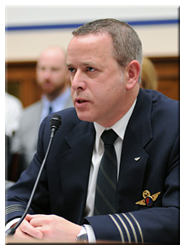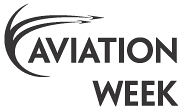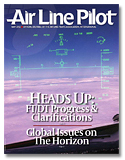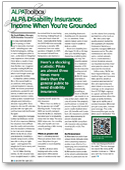|
View this message on the Web. |
 |
|
News from ALPA International |
|
April 26, 2012 |
|
|
|
Congress: Raise Airline Industry to One Level of Safety |
|
|
|

Capt. Sean Cassidy |
In April 25
testimony before the
U.S. House Aviation
Subcommittee, Capt. Sean
Cassidy, first vice
president and national
safety coordinator for
the Air Line Pilots
Association, Int’l,
called on Congress to
swiftly act to apply the
new FAA science-based
flight- and duty-time
regulations to both
passenger and cargo
airline pilots.
“All pilots are
human, and we experience
fatigue in the same way,
regardless of whether we
are flying passengers or
cargo in our aircraft,”
Cassidy told the
subcommittee. “Despite
this, the new
science-based fatigue
regulations apply only
to pilots who fly
passengers, and not to
those who fly cargo.
Leaving all-cargo pilots
out of the regulations
is a serious safety
concern.”
In his testimony,
Cassidy thanked
Rep. Chip Cravaack
(R-MN) and Rep. Tim
Bishop (D-NY) for
introducing the Safe
Skies Act of 2012, which
would apply the fatigue
rules to all air cargo
operations. “We urge all
members of this
Committee to cosponsor
HR 4350 and to swiftly
report out the Safe
Skies Act of 2012 to
help achieve one level
of safety across the
industry,” he said.
Return to top
|
|
|
|
|
As part of the
Association’s efforts to
engage its members more
fully, ALPA is launching
a poll of U.S. and
Canadian members to
pinpoint areas of the
union’s work that are
most important and
deserve the most
attention. The goal is
to increase member
participation in and
boost support for key
Association activities
and initiatives. The
telephone polling has
already begun, and the
online poll will start
in May. Polling
will provide valuable
information in the
following areas:
• pilot demographics;
• members’ knowledge
about ALPA (its
structure, governance,
financing, etc.);
• communications,
including how members
prioritize the
communications they
receive and whether they
are getting the
information they want
and need;
• volunteerism levels
and willingness of
members to become
personally involved;
• areas of ALPA work or
benefits provided that
are most important to
Association members, and
information about new
areas of work, benefits,
and services that
members desire.
Every member has the
opportunity to
participate in this
poll. If you are not
called within the next
few weeks, take the
opportunity to go online
when the poll opens on
our website.
|

|
|
KCM Implementation Begins |
|
 This
week, Known Crewmember (KCM)
site surveys were
conducted at the Denver,
Salt Lake City, and Las
Vegas airports with the
participation of ALPA
Local Council
representatives and
staff. The purpose of
these surveys was to
review the program with
the airport operator,
airline, and local
Transportation Security
Administration (TSA)
representatives at each
airport and determine
optimal locations for
the placement of KCM
access points. This
week, Known Crewmember (KCM)
site surveys were
conducted at the Denver,
Salt Lake City, and Las
Vegas airports with the
participation of ALPA
Local Council
representatives and
staff. The purpose of
these surveys was to
review the program with
the airport operator,
airline, and local
Transportation Security
Administration (TSA)
representatives at each
airport and determine
optimal locations for
the placement of KCM
access points.
The industry and TSA
representatives at all
three locations
expressed enthusiasm for
the program and have
given considerable
thought to how to make
KCM work best at their
properties. KCM is
slated to go on-line at
these three airports
beginning in July.
The next planned site
surveys are to be
conducted at the three
New York–area airports,
Philadelphia
International, and
Reagan Washington
National. Look for more
information about this
program in the near
future.
Return to top
|
|
|
Ex-Im Bank Reauthorization: Key Reforms Vital to Protect Jobs |
|
 As
Congress takes up the
reauthorization of the
Export-Import Bank of
the United States, ALPA
has urged lawmakers to
implement key reforms to
protect U.S. airline
workers’ jobs in
connection with the
Bank’s financing of
aircraft for foreign
airlines. As
Congress takes up the
reauthorization of the
Export-Import Bank of
the United States, ALPA
has urged lawmakers to
implement key reforms to
protect U.S. airline
workers’ jobs in
connection with the
Bank’s financing of
aircraft for foreign
airlines.“Airline
pilots and thousands of
other airline industry
employees across the
country are committed to
ensuring a thriving U.S.
airline industry because
they know it is vital to
promoting our country’s
economic viability. It
puts Americans to work,
it stimulates
manufacturing, and it
promotes commerce,” said
ALPA president Capt. Lee
Moak. “In order to
thrive, however, U.S.
airlines must be able to
compete in the global
marketplace. The Ex-Im
Bank’s subsidizing of
foreign airlines with
U.S. taxpayer money puts
U.S. airlines at a
disadvantage and
threatens thousands of
U.S. airline employees’
jobs.”
Over the past five
years, the Bank has
provided financing for
dozens of wide-body
aircraft to foreign
airlines at rates that
are not available to
U.S. airlines. Foreign
airlines are using many
of these Bank-subsidized
aircraft on routes that
are, have been, or could
be served by U.S.
airlines. As a result,
U.S. carriers have had
to withdraw from or
forgo entering routes
that might otherwise be
economically viable,
costing airline workers’
jobs and threatening the
ability of U.S. airlines
to compete on
international routes.
Read more.
Return to top
|
|
|
ALPA Leaders Address Critical NextGen Issues |
|
 During
this week’s “NextGen
Ahead” conference
sponsored by Aviation
Week, ALPA Air
Safety Organization
representatives Capt.
Sean Cassidy and F/O
Marc Henegar presented
the association’s views
on several key NextGen
issues. The Washington,
D.C., conference drew
attendance from
government and industry
organizations to discuss
topics across the full
spectrum of NextGen
operations. During
this week’s “NextGen
Ahead” conference
sponsored by Aviation
Week, ALPA Air
Safety Organization
representatives Capt.
Sean Cassidy and F/O
Marc Henegar presented
the association’s views
on several key NextGen
issues. The Washington,
D.C., conference drew
attendance from
government and industry
organizations to discuss
topics across the full
spectrum of NextGen
operations.Cassidy,
ALPA first vice
president and national
safety coordinator,
summarized ALPA’s
position on Remotely
Piloted Aircraft
integration in the
National Airspace System
(NAS) as “first, do no
harm,” which reflects
ALPA’s established view
that unmanned aircraft
should not be allowed
unrestricted access to
the NAS until the
aircraft, pilots, and
operators meet the same
level of safety as all
other NAS users.
Cassidy outlined the
need for standards and
technology development
to continue to support
that goal. He recognized
the potential value of
some proposed uses of
RPA, but also cautioned
that as for all NAS
users, access to and
operation in the NAS
must be contingent on
maintaining One Level of
Safety for the NAS with
the only difference
being where the pilot
sits.
Read more.
Return to top
|
|
|
Island Air Pilots Prepare for New Aircraft, Growth |
|
|
Island Air pilots are
preparing to open
negotiations following a
recent announcement by
senior management that
the company plans to
grow and expand its
fleet. The airline plans
to replace the existing
Dash-8 fleet with ATR
72-212 aircraft in 2012
and add three more ATRs
in 2013. ATR service is
expected to begin
September 1. “This is
an exciting time for our
pilots and our company,”
said Capt. Monte Vories,
acting MEC chairman. “We
look forward to the
opportunities this
expansion will provide
and are committed to
doing our part to ensure
a smooth transition to
the new fleet.”
Negotiations for the
new aircraft are
scheduled to begin next
week. The pilots’ goal
is to secure a fair
agreement that covers
all aspects related to
the new aircraft prior
to the in-service date.
If the parties have not
reached an agreement by
that date, the issue
will go to arbitration,
and any compensation or
other adjustments will
be retroactive to the
in-service date.
The MEC and
Negotiating Committee,
along with a cadre of
ALPA National officers
and staff experts, have
worked tirelessly over
the past few weeks to
evaluate current
contract provisions,
analyze similar aircraft
rates, and determine an
overall bargaining
strategy. They have also
launched a multifaceted
communications program
to get pilot input and
provide transparency
throughout the
negotiations process.
This will help ensure
that pilots will be
ready to vote on any
agreement put forth for
ratification.
Return to top
|
|
|
|
  Stay connected with your
union, your profession,
and your industry by
reading Air Line
Pilot magazine and
watching monthly
episodes of The
FlightDeck. Stay connected with your
union, your profession,
and your industry by
reading Air Line
Pilot magazine and
watching monthly
episodes of The
FlightDeck.
Learn about the new
proposed pilot
certification and
qualification
requirements on page 25 of
the
May issue of Air Line Pilot magazine.
On the 14th
installment
of
The
FlightDeck, find
out about ALPA’s Federal
Flight Deck Officer
Call-to-Action campaign.
Remember that both Air Line Pilot
and The FlightDeck
can also be accessed
from the members-only
portion of the ALPA
website at
www.alpa.org.
Return to top
|
|
|
|

Here’s a shocking statistic: Pilots are almost three times more likely than the
general public to need disability insurance. ALPA’s disability products,
including Loss of License, Loss of License Plus, and Lump Sum Loss of License,
are designed by pilots to meet the need of pilots and are backed by Guardian
Life Insurance Company of America, a superbly managed, AAA-rated insurance
carrier.
To learn why coverage is so important and how you can adequately protect
yourself and your loved ones, read
“ALPA Disability
Insurance: Income When
You’re Grounded,” in
the ALPA Toolbox column
in the April 2012 issue
of Air Line Pilot
magazine.
Return to top
|
|
|
We Want Photos from the Line |
|
 We
want to see what you see. Share your pictures from the line. Air Line Pilot
encourages you to submit your high-quality prints from a developer or
high-resolution digital images. Your photo could be featured on the cover of a
future magazine! We
want to see what you see. Share your pictures from the line. Air Line Pilot
encourages you to submit your high-quality prints from a developer or
high-resolution digital images. Your photo could be featured on the cover of a
future magazine!
Send your photos to publishing@alpa.org.
Thanks.
Return to top
|
|
|
|
|
• The Washington Post asks the question: “Should we worry about cities
abandoned by airlines?”
Read more.
• An article in the Huffington Post includes results from a TripAdvisor
air travel survey, which reveals some interesting traveler habits.
Read more.
• According to the Associated Press, the UN’s World Trade Organization says 1
billion people will cross international borders as tourists this year for the
first time.
Read more.
• MSNBC reports that according to a paper published in the journal Cephalagia,
Italian neurologists report on 75 people who suffer from what they describe as a
“peculiar headache” while flying. It seems to mostly affect men and typically
flares up during the flight’s landing.
Read more.
Return to top
|
|
|
|
|
On April 28, 1949, ALPA broke ground at Chicago Municipal Airport (now Midway)
for the first Association-owned headquarters building.
Return to top
|
|
|
Feedback & E-mail Address Changes |
|
| Questions or comments on this FastRead? Give us your feedback at
communications@alpa.org. If you have moved or changed your ISP or e-mail
address, please update your ALPA records. If you don’t, you
will no longer receive the ALPA FastRead and other e-mail bulletins and notices,
and once your postal forwarding order expires, you’ll no longer receive the
magazine and other ALPA mail. You can do it yourself by going to
www.alpa.org and logging
in. Go to “My ALPA” in the menu at the top of the page, and from there, you’ll be
instructed how to make the necessary changes. If you don’t have access to the
members-only section of
www.alpa.org, you can
e-mail your requests by sending them to
membership@alpa.org. Be sure to include your member number or enough other
information so that we can identify you in the membership database, and tell us
what information needs to be updated. Please note that it is not sufficient
just to notify your LEC or MEC of these changes—you should register them with
the ALPA Membership Department in Herndon. Can’t remember your member number
or how to log in? Need information about your ALPA insurance programs? These and
other questions about ALPA services can be answered by contacting
membership@alpa.org. Return to top
|
|
|
Air Line Pilots Association, Int’l
1625 Massachusetts Avenue NW
| Washington, DC 20036 | 703-689-2270 |
|



